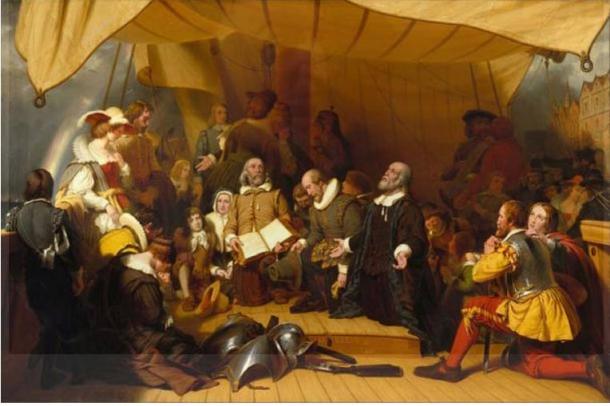Hilarious Events from Napoléon’s Petite Package to Pythagoras’ Fear of Farts
History is often presented in grey, rather dry terms, but when you do a bit of digging, our past is full of remarkable people who had wicked senses of humor and died with as much vigor as they lived. In this article we will look at some of the most prominent people and funny events in history, where you just have to laugh.
Plea For A Pilgrim’s Pint
The Pilgrims were the first English settlers of the Plymouth Colony in present-day Plymouth, Massachusetts, United States. It has been said that the first thing said to the Pilgrims by the Native American Samoset, was specifically: “Do you have any beer?” in perfect English.
European trade routes to North America had already existed for several generations and cod fishermen and trade diplomats had traveled extensively to the Americas from Europe. Historical records back up the fact that Samoset was the first Native American to greet the pilgrims and the possibility that he requested a cold beer is actually supported by most specialists.

‘The Embarkation of the Pilgrims’ (1857) by American painter Robert Walter Weir at the United States Capitol in Washington, DC. (Public Domain)
The Medical Madness of Robert Liston
Robert Liston was a famous 19th-century English physician renowned for his ‘speedy surgeries’ – which were recorded “as often lasting only around 30 seconds.” In 1837, he published Practical Surgeries arguing the importance of quick surgeries; “these operations must be set about with determination and completed rapidly.” Among the stories of Liston’s slick surgeries is this following record, which is ‘possibly’ apocryphal:
“In 1847, Robert Liston performed an amputation in 25 seconds, operating so quickly that he accidentally amputated his assistant’s fingers as well. Both patient and assistant later died of sepsis, and a spectator reportedly died of shock, resulting in the only known surgical procedure with a 300% mortality rate.”
Even with this sort of mishap, Liston’s overall mortality rate was much better than his peers. According to historian Richard Hollingham in his book Blood, Guts, History “of the 66 patients Liston operated on between 1835 and 1840, only 10 died, a death rate of only around 16%.”

Portrait of Scottish Surgeon Robert Liston (1794–1847), painted in 1847 by Samuel John Stump. (Public Domain)
Napoléon’s Petit Package
Napoléon Bonaparte, the 18th century French statesman and military leader who rose to prominence during the French Revolution, left a political and cultural legacy that has established him as one of the most celebrated and controversial leaders in human history. But when he died, a little secret popped out that might go some ways to explaining why he was so angry.
Napoléon’s priest-confessor (Vignali) chopped off his penis, which was later sold in a collection that ended up in the possession of a Dr. Abraham Rosenbach. Rosenbach took the penis on tour, presenting it to the public on a ‘small’ velvet cushion in New York’s museum of French art. And while this story sounds completely made up, every part is perfectly true. An article in The Independent about this incident said:
“It [Napoléon’s penis] was cut off during his autopsy by his somewhat cruel doctor, Francesco Autommarchi, in front of 17 witnesses, before it was then acquired by priest Abbé Anges Paul Vignali who gave the leader his last rites. It passed through Vignali’s family before it was eventually bought by American rare books dealer A.S.W. Rosenbach in 1924 and then displayed at the Museum of French Art in New York in 1927.”

Napoleon in 1806’by Édouard Detaille. (Public Domain)
This not-so-prized penis is now owned by the Lattimer family in New York.
Pythagoras’ Fear of Farts
Pythagoras of Samos was a 5th century BC Ionian Greek philosopher and the eponymous founder of the Pythagoreanism movement. He directly influenced the philosophies of Plato, Aristotle, and, through them, Western philosophy was founded.
Around 530 BC, the man who made one of the most iconic mathematical discoveries in history traveled to Croton in South Italy and founded a school in which initiates were sworn to secrecy and lived a communal, ascetic lifestyle – including vegetarianism…and the prohibition of beans. Pythagoras had a phobia of beans and legends have it that he died after attackers chased him into a field of beans, where refusing to enter, he was killed. Historians are not certain why beans were off-limits, but a paper published on Classical Wisdom tells us that “Pythagoras believed that a human being lost a part of his or her soul whenever passing gas.”

French manuscript from 1512/1514, showing Pythagoras turning his face away from fava beans in revulsion. (Public Domain)
So far as his dying through his bean phobia is concerned, a paper published on Philosophy Now tells that Pythagoras was being pursued and stopped at “A vast bean field” where his eyes focused “On a single bean dangling inches from his papyrus-covered feet.” Unwilling to trample upon even a single bean, his pursuers caught up with him “and bringing the knifes down hard, spilled Pythagoras’ blood on the plants – ending his life for the sake of a bean, and for the deep wisdom immersed in that diminutive cosmic object.”
Astronomically Bad Luck for Tycho Brahe
The 16th century Danish nobleman, alchemist, and astronomer Tycho Brahe became famous for his accurate and comprehensive celestial observations. As such he was described as “the first competent mind in modern astronomy to feel ardently the passion for exact empirical facts.”
However, not only did he lose his nose in a duel with another scientist while trying to settle whose mathematical formula was best, but in 1601 during a party his bladder burst, and he died 10 days later. All this is 100 % fact! A Gizmodo article explains that “In 1566 at the age of 20, he lost part of his nose in a duel with another Danish nobleman named Manderup Parsbjerg. The duel is said to have started over a disagreement about a mathematical formula.”

Portrait of Tycho Brahe. Who would guess his nose is a prothesis? (Public Domain)
Historians had long heard rumors that Brahe’s death was caused by “A ruptured bladder after holding his urine for too long,” and a recent Live Science article explains that “when his the body was exhumed in 2010, researchers found high levels of mercury in his system confirming that he did indeed die from a ruptured bladder.”
Mozart’s Arse Emptied a Room – And You Can Still Hear this Funny Event in History!
Having composed more than 600 works of symphonic, operatic, and choral genius, in 1782 Mozart wrote a six-piece canon titled “Leck mich im Arsch.” In English this translates best as “Kiss my arse” or, in American, “Kiss my ass”.
Mozart waited until his friends were drunk at a glitzy party, then, in front of 400 royals and nobles, six female choir singers delivered “Kiss my ass” – almost emptying the ballroom. While Europe’s elites scuttled away in disgust, Mozart’s four oldest friends crawled and writhed around the suddenly empty dance floor gasping for air as they cried into their hands, virtually worshiping the unpredictable comedic genius that had exploded from their old friend Mozart.
Top Image: ‘Democritus’ (1630) by Johannes Moreelse. There have certainly been some strange and funny events in history. Source: Public Domain
By Ashley Cowie





